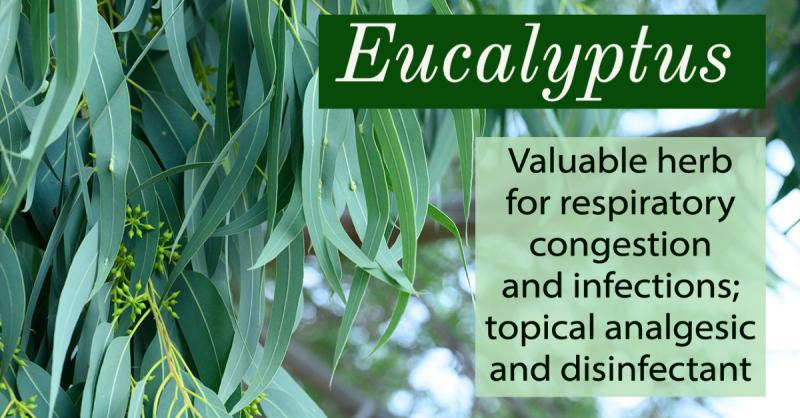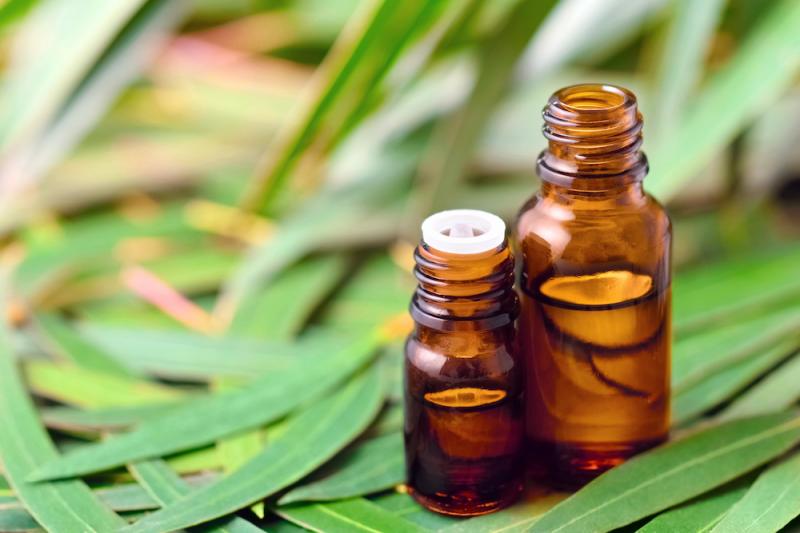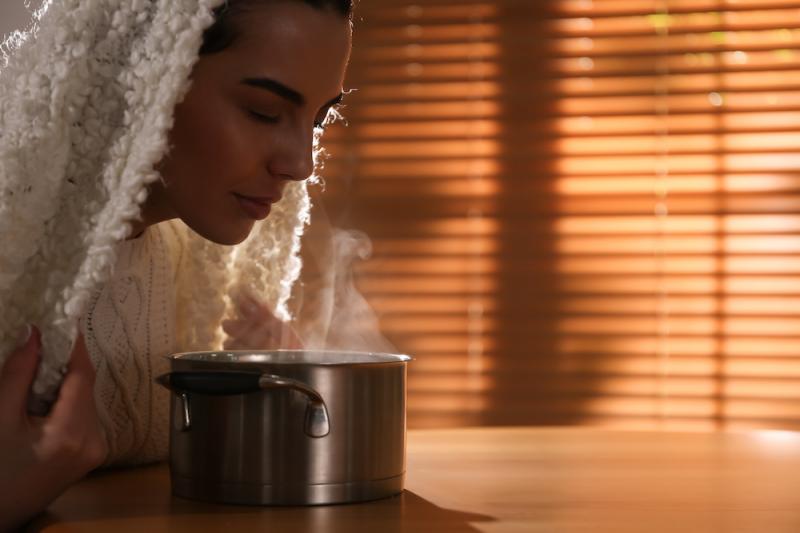
When I think about my experiences living in and traveling to various parts of California, one of the things I fondly remember is the smell of eucalyptus trees. Maybe it’s because I have had respiratory problems for much of my life, but I really love standing in a grove of eucalyptus trees and just smelling the fresh quality they bring to the air.
Eucalyptus is a genus containing about 700 species of trees, most of which are native to Australia, and are now grown all over the world. Most people know eucalyptus because of its wonderful essential oil, which is responsible for its distinctive odor. We’ll talk about the uses of eucalyptus oil in this article, but for those lucky enough to live in areas where they grow, we’ll also talk about uses you can make of the leaves.
Eucalyptus Essential Oil
 Possessing a strongly vaporous and camphorus odor, eucalyptus oil is refreshing and stimulating. It opens up the lungs when they are congested while helping the body fight off any infectious organisms that are contributing to that congestion. It breaks up mucus and relieves damp and stagnant conditions in tissues. One of the plant’s signatures is that the trees absorb huge amounts of water, so when they are planted in marshy areas, they help to dry them out. Eucalyptus does the same thing in the body; it relieves swampy, stagnant conditions in the tissues.
Possessing a strongly vaporous and camphorus odor, eucalyptus oil is refreshing and stimulating. It opens up the lungs when they are congested while helping the body fight off any infectious organisms that are contributing to that congestion. It breaks up mucus and relieves damp and stagnant conditions in tissues. One of the plant’s signatures is that the trees absorb huge amounts of water, so when they are planted in marshy areas, they help to dry them out. Eucalyptus does the same thing in the body; it relieves swampy, stagnant conditions in the tissues.
Because of its antimicrobial properties eucalyptus oil is often added to mouthwashes, toothpaste, and other personal care products to reduce bacterial, fungal, and viral activity. It can be used topically like tea tree oil to disinfect wounds or treat acne.
It can even be used to help disinfect water. The Australian herbalist, Dorothy Hall said that a single drop added to a gallon of suspect drinking water and left overnight will kill pathogens and help to make the water safe to drink. She also says that a small amount can be used to freshen musty-smelling clothes.
Eucalyptol
 Eucalyptus oil contains a compound called eucalyptol, which is not just antimicrobial; it is also mucolytic, analgesic, and anti-inflammatory. Research suggests that it might block the production of arachidonic acid metabolites that mediate pain. It may inhibit cyclooxygenase pathways, slowing the production of cytokines responsible for inflammation such as tumor necrosis factor (TNF)-alpha, interleukin (IL)-1beta, leukotriene B4, and thromboxane B2.
Eucalyptus oil contains a compound called eucalyptol, which is not just antimicrobial; it is also mucolytic, analgesic, and anti-inflammatory. Research suggests that it might block the production of arachidonic acid metabolites that mediate pain. It may inhibit cyclooxygenase pathways, slowing the production of cytokines responsible for inflammation such as tumor necrosis factor (TNF)-alpha, interleukin (IL)-1beta, leukotriene B4, and thromboxane B2.
Put into simple terms, this means that when you apply eucalyptus oil topically, it can ease pain and inflammation. So, it can be helpful in easing pain in arthritic joints, sore muscles, or neuralgia. It can also be used to help wounds and burns to heal, kill skin infections, and relieve acne. Applied topically it also acts as a natural insect repellant.
Respiratory Inhalation
My favorite way to use eucalyptus is as an inhalant for respiratory congestion and infection. You can either smell it directly out of the bottle or drop it into some water that has been heated to a boiling point and removed from the stove. You can then inhale the steam. I like to combine eucalyptus with pine oil for this purpose.
An inhalation of eucalyptus can act as an expectorant for coughs, including whooping cough. It can also help make breathing easier in cases of sinusitis, asthma, or bronchitis. It may also be helpful for chronic respiratory conditions like reactive airway disease, COPD, and pulmonary tuberculosis.
Eucalyptus Leaves
 Eucalyptus leaves also have medicinal uses. You can make a tea from them and use it for digestive infections, gargle for sore throat, or mouthwash for gum disease. The leaf tea also helps to lower blood sugar levels by increasing insulin secretion and improving glucose metabolism in muscles. Alcohol extracts of the leaf have anti-inflammatory activity and can be used both internally and topically. Internally, the leaf extract might be helpful for bladder diseases, ringworms, intestinal infections, and fevers.
Eucalyptus leaves also have medicinal uses. You can make a tea from them and use it for digestive infections, gargle for sore throat, or mouthwash for gum disease. The leaf tea also helps to lower blood sugar levels by increasing insulin secretion and improving glucose metabolism in muscles. Alcohol extracts of the leaf have anti-inflammatory activity and can be used both internally and topically. Internally, the leaf extract might be helpful for bladder diseases, ringworms, intestinal infections, and fevers.
Another interesting use for the leaves is as a cough medicine. This can be made by collecting fresh leaves and covering them with honey and letting this sit for two or three weeks.
Using Eucalyptus
 The safety of using eucalyptus oil internally is debated. Dorothy Hall felt the oil shouldn’t be used internally, but the oil is listed as GRAS (generally recognized as safe) by the FDA and people have used the oil internally with no ill effects. To use it safely, it should be diluted, as the undiluted oil can irritate the mucus membranes. Put a drop in 10-20 drops of olive oil or a small amount of coconut oil for internal use. Also, limit internal use to a period of 12 weeks or less. Long-term use has resulted in neurotoxicity.
The safety of using eucalyptus oil internally is debated. Dorothy Hall felt the oil shouldn’t be used internally, but the oil is listed as GRAS (generally recognized as safe) by the FDA and people have used the oil internally with no ill effects. To use it safely, it should be diluted, as the undiluted oil can irritate the mucus membranes. Put a drop in 10-20 drops of olive oil or a small amount of coconut oil for internal use. Also, limit internal use to a period of 12 weeks or less. Long-term use has resulted in neurotoxicity.
For internal use, it would be better to use a tincture or tea of the leaf, but again, it’s a medicinal herb, not a food herb, and should be used for limited periods of time. Make the tea with 1 teaspoon of crushed dried leaves per cup of water and steep for 10 minutes. You can use 1-3 cups daily. The dose for the tincture is ½ teaspoon twice daily.
Eucalyptus oil is safe for topical use. However, it’s best to dilute it with a fixed oil for topical use as it’s less irritating to the skin. It should be used topically with caution in young children under the age of four because of possible neurotoxicity. Its best and safest use, however, is as an inhalation, which one can get by just walking through a grove of these amazing trees.
Downloads
Steven's Articles
January
-

-
Goldenthread, Phellodendron, and Yellow Root
Three herbal remedies containing the infection-fighting…
-

-
Teasel
A traditional herb for healing bones and joints…
-

-
Barberry and Healthy Personal Boundaries
A thorny shrub for fighting infections and supporting…
December
-

-
The Evidence for Berberine
A yellow alkaloid found in traditional infection-fighting…
-

-
The Sensible Use of Caffeinated Herbs
Kola nuts, guarana, and yerba mate and other herbs…
-

-
The Health Benefits and Problems with Coffee
This popular caffeinated beverage can be beneficial…
October
-

-
Understanding Caffeine & Cellular Adaptation
Preserving the power of caffeine's buzz and the…
September
-

-
Horseradish
A pungent spice for aiding protein metabolism…
-

-
Banaba or Crepe Myrtle
A beautiful tree from Southeast Asia whose leaves…
August
-

-
Monkeyflowers
Flower essences to help see ourselves more clearly…
-

-
Mariposa Lilies
Strengthening the bond between mother and child…
-

-
The Noble Bay Leaf
A common kitchen herb for aiding digestion and…
-

-
Epimedium: Horny Goat Weed
A circulatory stimulant and kidney yang tonic…
July
-

-
The Medicinal and Nutritional Benefits of Apricots
A nutritious fruit and valuable medicinal seed for coughs
-

-
Dogwoods
Asian dogwood is used to stop excessive discharge,…

